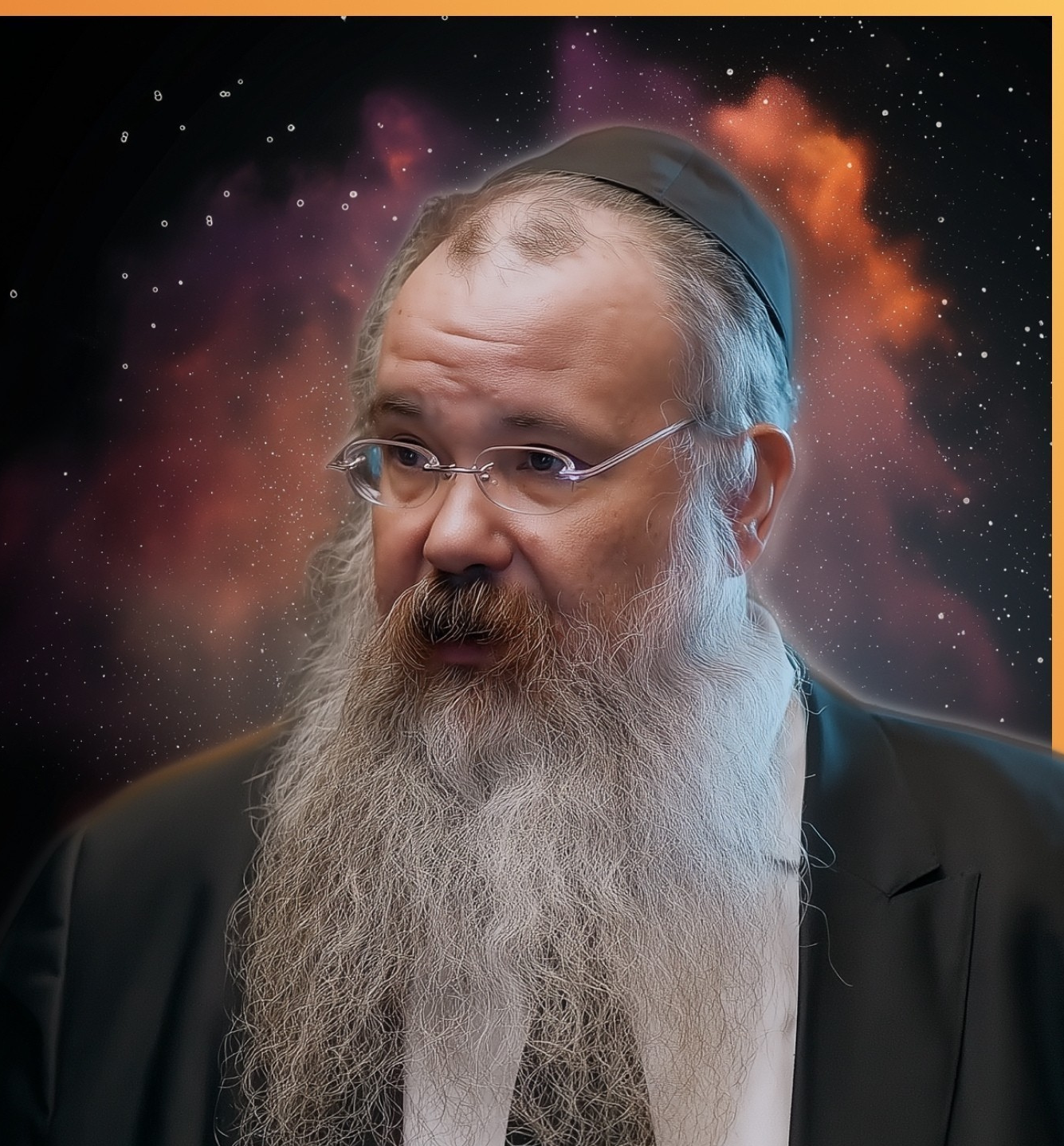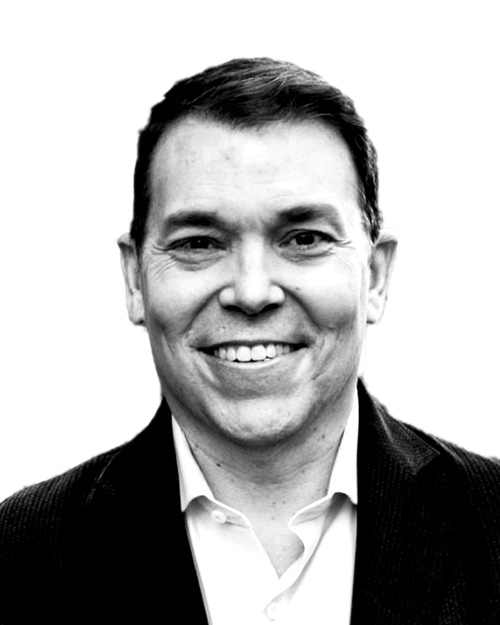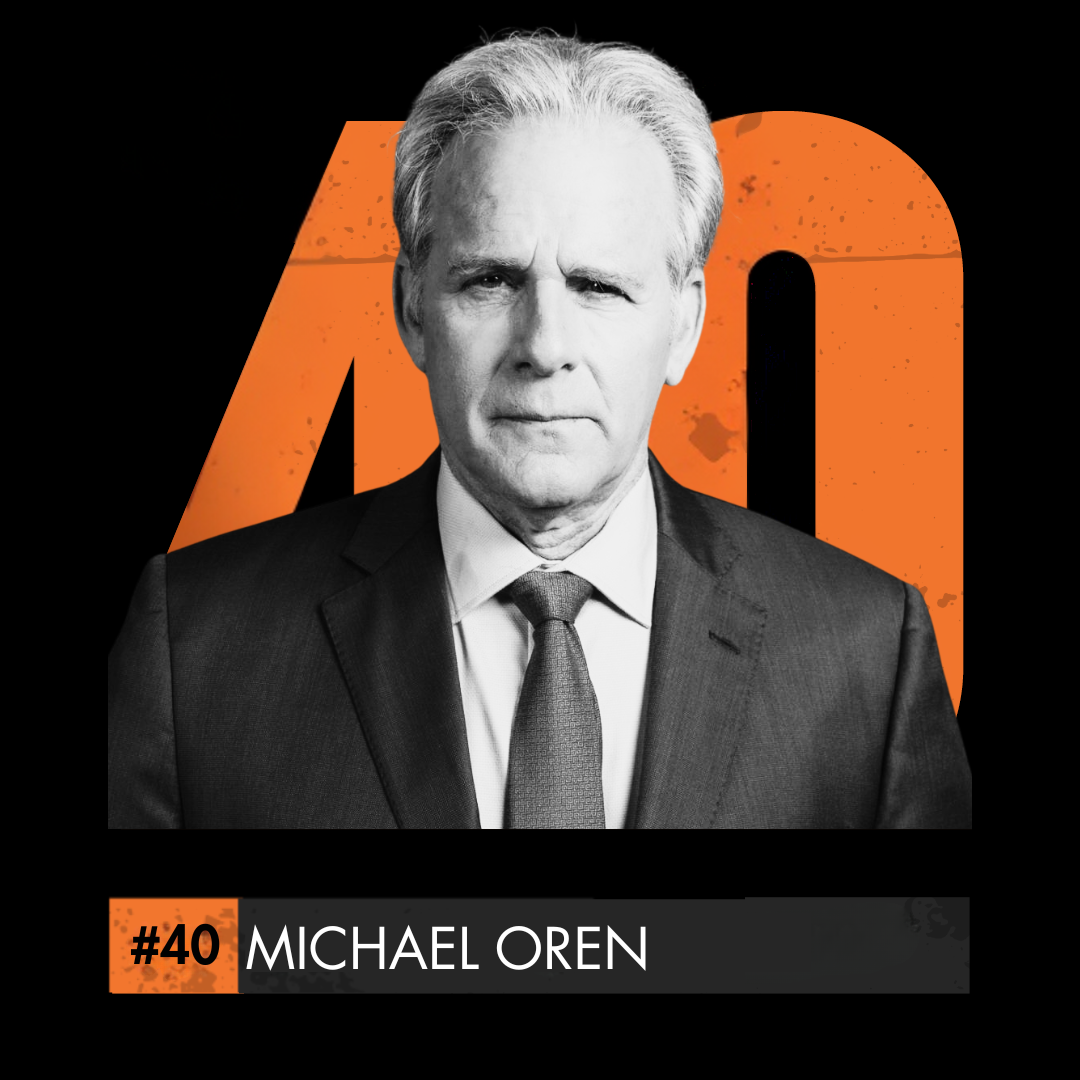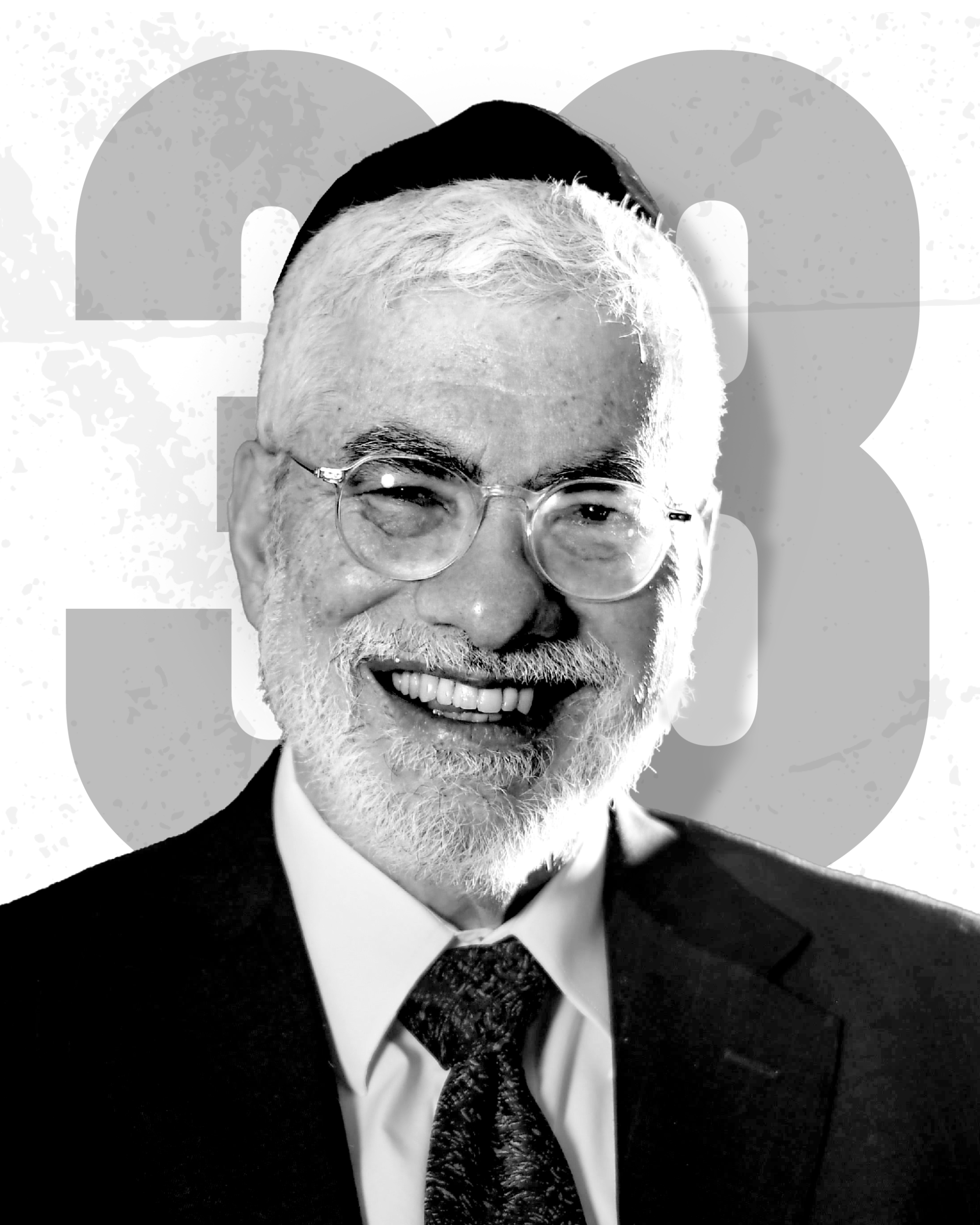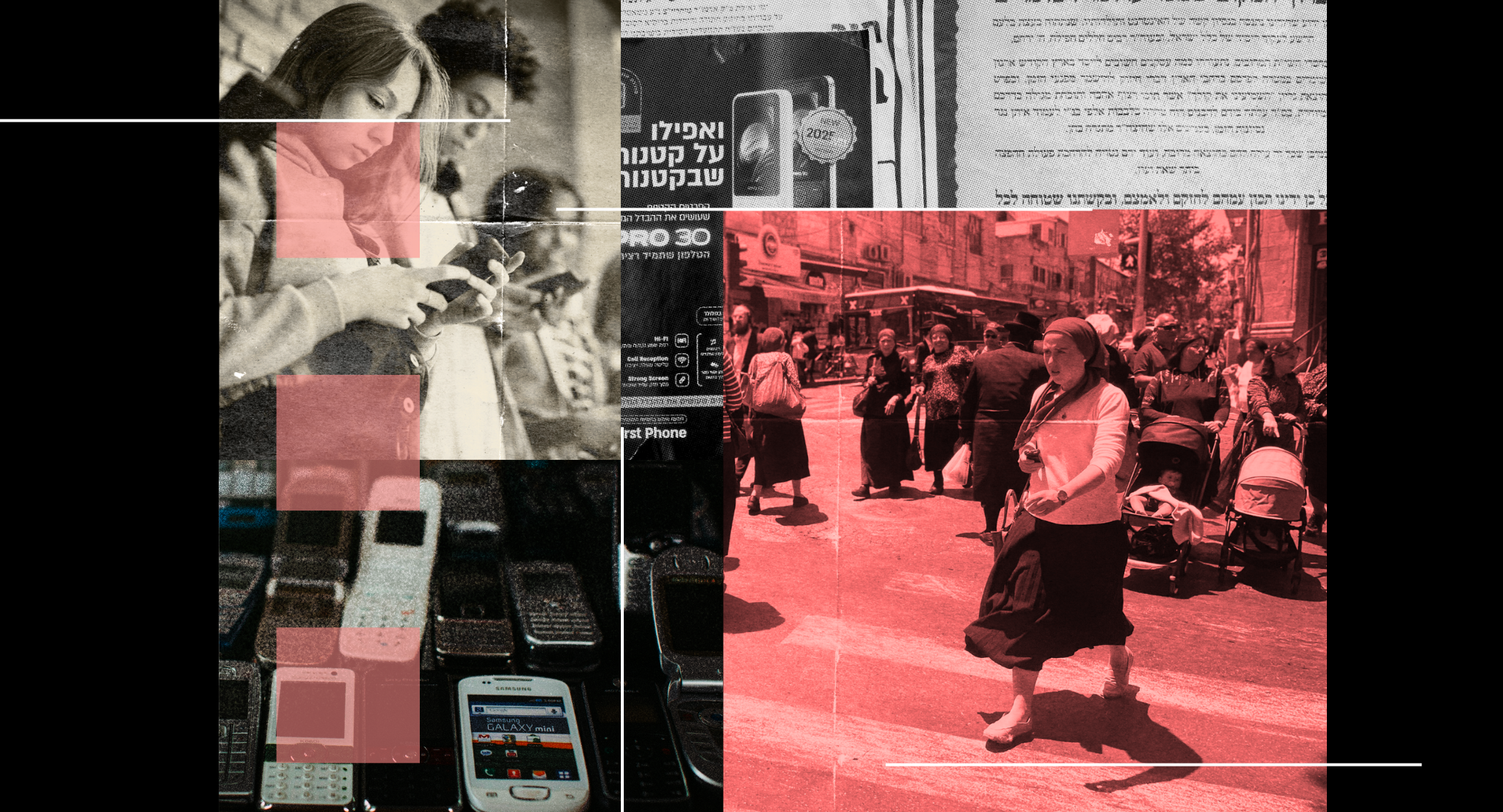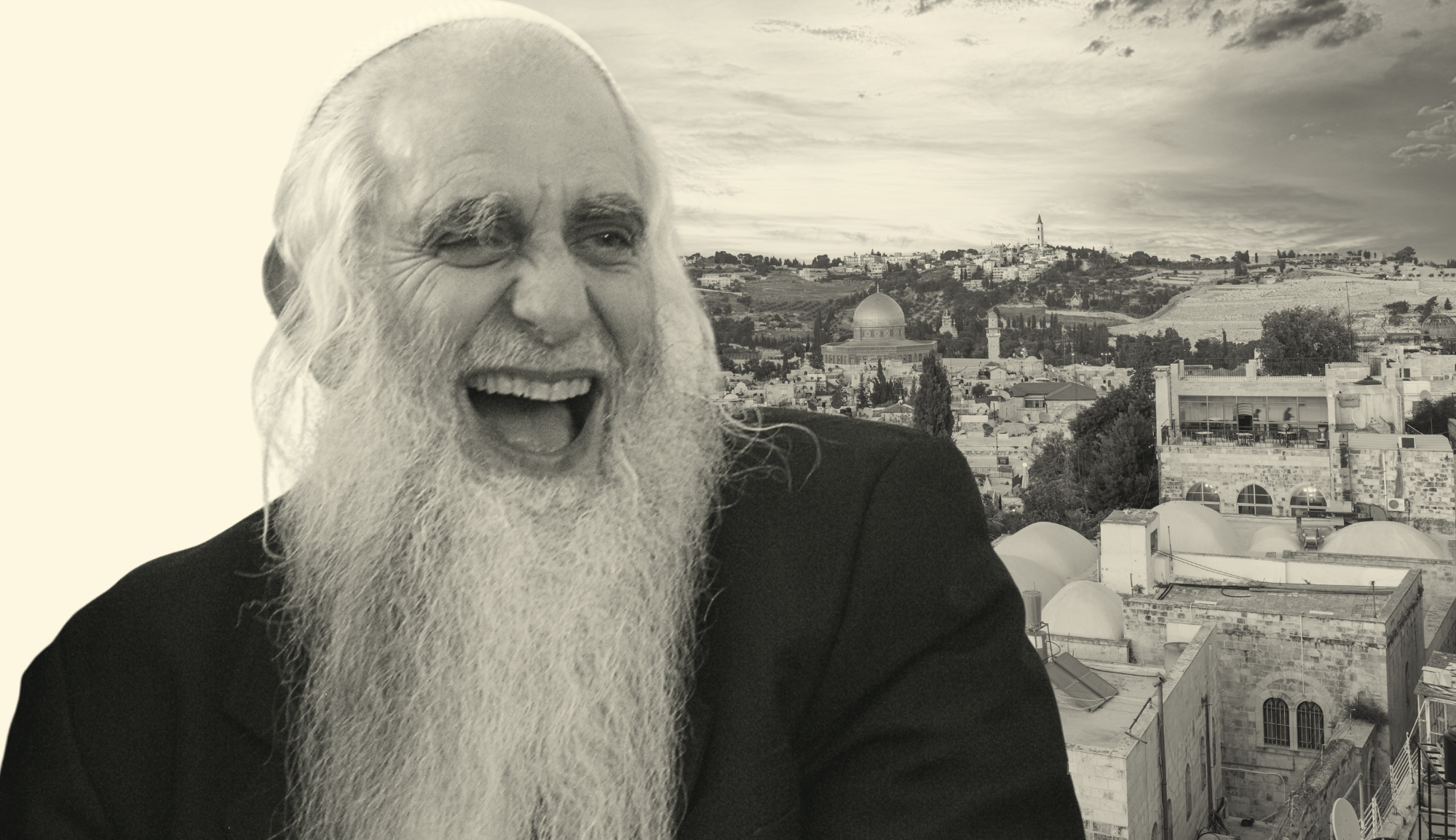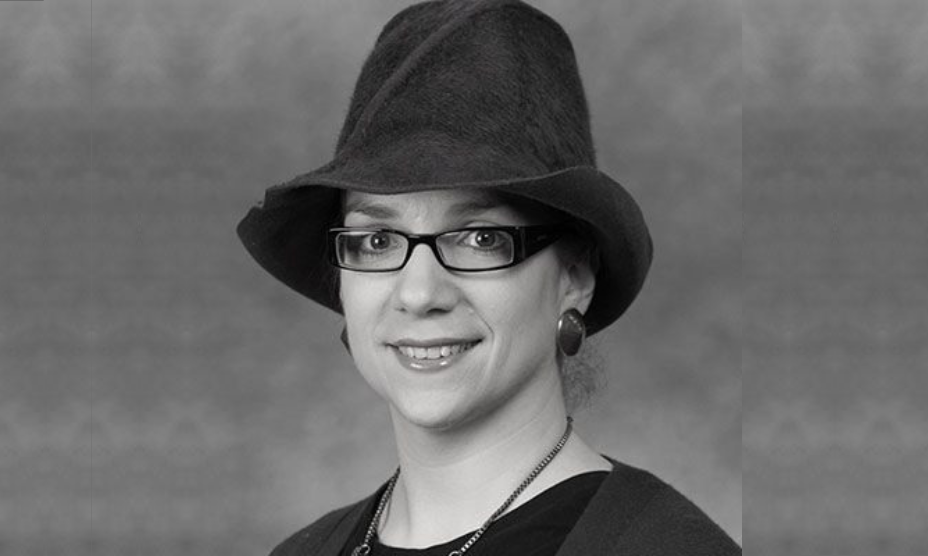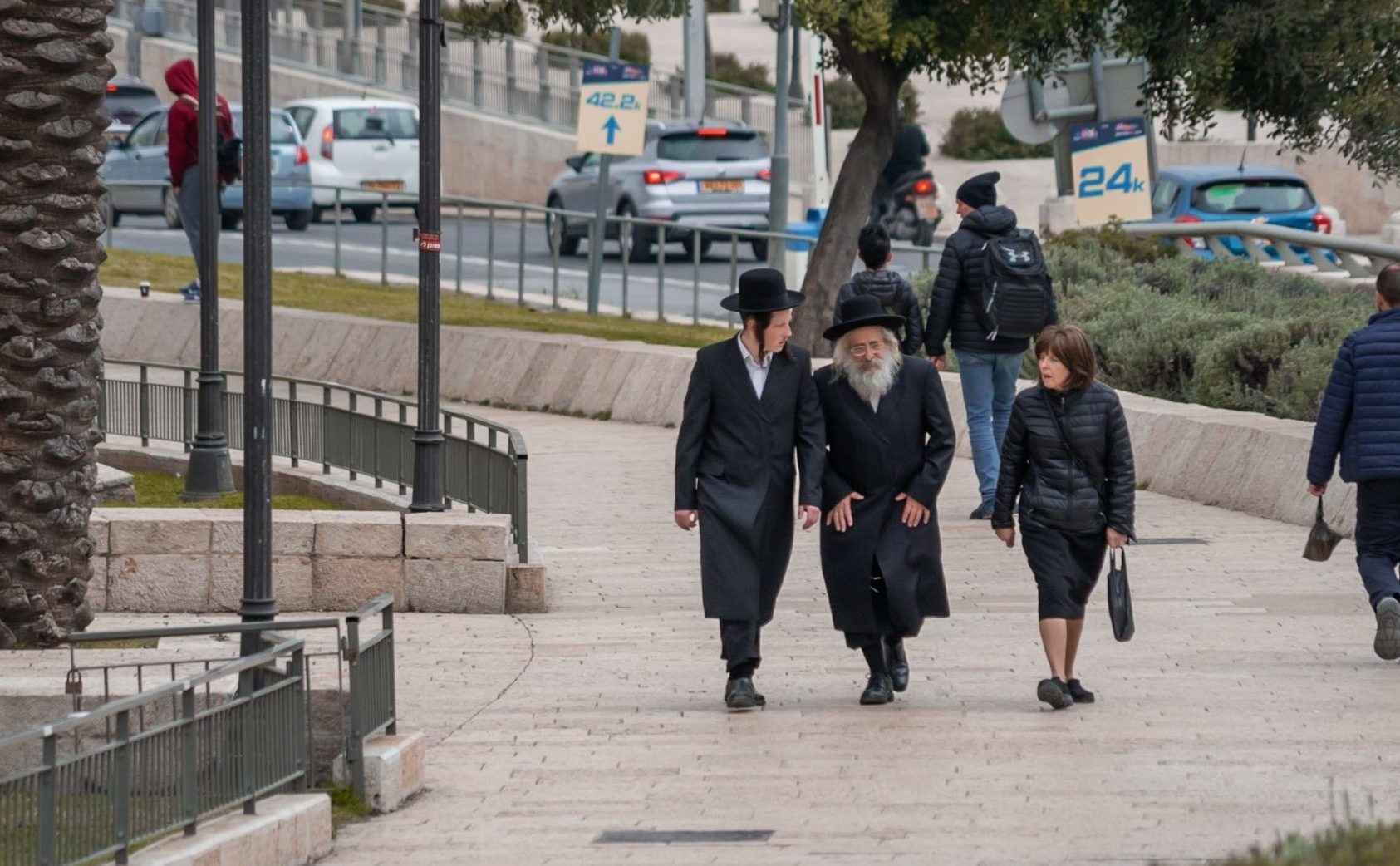Ruby Chen: My Son is Likely a Deceased Hostage. Don’t Forget Him in Gaza.
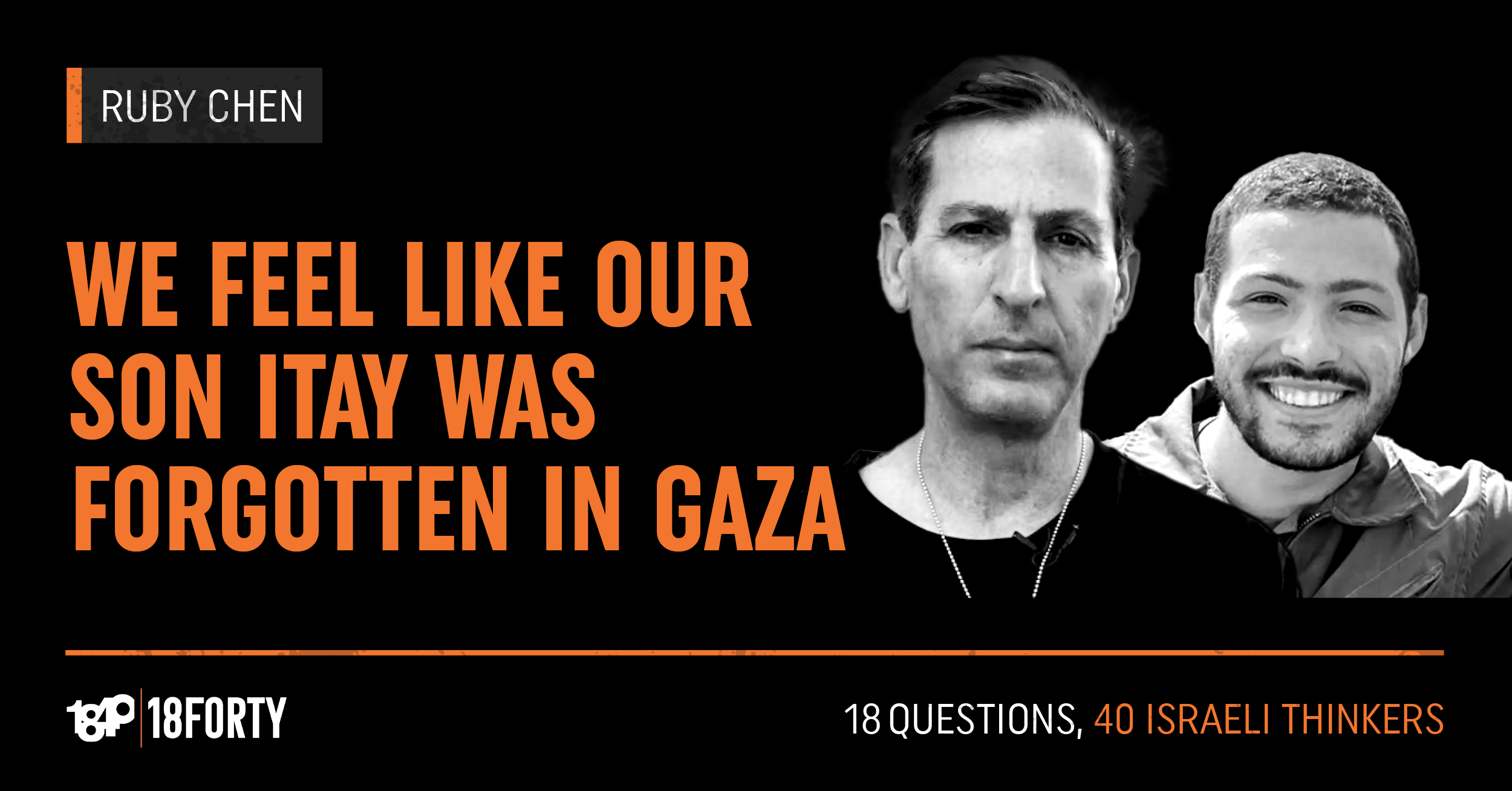
Summary
Sgt. Itay Chen was taken captive by Hamas on October 7. The IDF believes he is dead—but his family is still holding out hope.
Ever since Itay was declared Missing in Action, Ruby and Chagit Chen—and the Chen family—have tirelessly fought to bring him home. Ruby and Itay are American citizens, so they hoped that would play to their advantage. In March of 2024, the IDF declared that Itay was killed on Oct. 7 and his body is being held by Hamas.
Itay’s family has chosen not to sit shiva until his body is returned from the Strip for burial. They are still holding out hope—however slim, or grim—that Itay’s fate is different than the army believes. That he will return home alive.
Ruby joins us to speak about his family’s reality over the last 500-plus days—fighting for Itay while continuing their lives, working with US administrations, and ensuring he is not forgotten.
This interview was held on March 12.
For more 18Forty:
NEWSLETTER: 18forty.org/join
CALL: (212) 582-1840
EMAIL: info@18forty.org
WEBSITE: 18forty.org
IG: @18forty
X: @18_forty
Transcripts are lightly edited—please excuse any imperfections.
Ruby Chen: We live in a different universe where what we try to manage is how do we look at the end goal, which is being reunited with our son, and how do we move that closer. So a day passed by, a week passed by, a month passed by, a year passed by. Did I move it an inch? When we talk to people, we have our own language of how we speak to one another, hostage families. It’s a different language than common people.
Sruli Fruchter: What language is that?
Ruby Chen: Hostage family language.
Sruli Fruchter: From 18Forty, this is 18 Questions, 40 Israeli Thinkers, and I’m your host, Sruli Fruchter. 18 Questions, 40 Israeli Thinkers is a podcast that interviews Israel’s leading voices to explore those critical questions people are having today on Zionism, the Israel-Hamas war, democracy, morality, Judaism, peace, Israel’s future, and so much more. Every week, we introduce you to fresh perspectives and challenging ideas about Israel from across the political spectrum that you won’t find anywhere else.
So if you’re the kind of person who wants to learn, understand, and dive deeper into Israel, then join us on our journey as we pose 18 pressing questions to the 40 Israeli journalists, scholars, and religious thinkers you need to hear from today. Last week, we aired an episode with Jonathan Dekel-Chen, the father of Sagui Dekel-Chen, who was released from Hamas captivity after 498 days. These episodes are part of a parallel aim of this podcast for the moment, to elevate the voices and experiences of the hostage families in Israel today, not as thinkers, but as people, with complicated, difficult, and traumatic lives, hearts, and hopes. Today’s episode is with Ruby Chen, the father of Itay Chen.
Sergeant Itay Chen was stationed down south on October 7th, 2023, when Hamas and Islamic Jihad invaded Israel’s borders in their barbaric terrorist attack. Two days later, Itay’s family was notified that he was missing in action, likely taken captive by Hamas. Ever since, Ruby and Chagit Chen and the entire Chen family have tirelessly fought for Itay’s freedom. Ruby and Itay are American citizens, so they hoped that this would play into Itay’s advantage.
They worked very closely with the Biden administration and the Trump administration, flying back to Washington every few weeks, speaking to whomever they can, to do whatever they could to bring Itay home. In March of 2024, the IDF declared that Itay was killed on October 7th, and that his body was being held by Hamas. Itay’s family has chosen not to sit shiva until his body is returned from the Gaza Strip, and they are still holding out for hope, however slim and however grim, that Itay’s fate is different than the army believes. They hope, even by a prayer or by a miracle, that Itay will return home alive.
Unlike our interview with Jonathan Dekel-Chen, whose son Sagui was released, today I spoke with Ruby Chen, whose son is likely killed and still held in Gaza by Hamas. I spoke to Ruby about his and his family’s experiences and realities over the last 500 plus days, how they managed to fight for Itay while continuing their lives, how they work with US administrations, how they keep Itay at the fore of their minds, and how every single day is dedicated to bringing him home. You can find more about the Chens advocacy to bring Itay home through their social media channels linked in the description below and by taking action of your own. One of the things that Ruby repeatedly emphasized is that everyone can do something, even while not knowing whether or not their actions are moving the needle or keeping things stagnant.
I hope you enjoy our conversation.
Ruby, thank you so much for joining us on the podcast. It’s such a privilege and an honor to be able to speak to you about your son Itay and your experiences and to hold space for that in this interview. I want to start, I think that many times in these types of formats and these types of interviews, it’s very easy to lose sight of the real humans that we’re speaking about.
And so I want to know from you as Itay’s father, who was Itay before October 7th and who has he been for you since October 7th?
Ruby Chen: So Itay is the middle child of three kids that we have. So he has a elder sibling and a younger sibling. So he is the connector inside of the family. We are New Yorkers and have been to New York and have family out in New Jersey and Boston as well.
And Itay, as a middle sibling, I am as well. The middle sibling is the one that always needs to find his path, so to speak. As the eldest is the one that gets first the PlayStation or the car keys. And the youngest is the youngest.
So Itay was the more challenging one where he tied out about 10 different extracurricular activities. And his mom is the definition of a soccer mom that did and took him to all the type of different extracurricular activities you could think of. He zoned into two main activities. One would be basketball.
Sruli Fruchter: As a New Yorker, I’m sure you were proud.
Ruby Chen: Unfortunately, if you want to talk about that, he decided, even though I am a very avid, proud New Yorker and New York Knicks fan, he decided to become a Boston Celtics fan, which is something that, God help us, I do not know how that happened. And I will always remember vividly the day when he was about 15. As a dad, you let the kid win when playing basketball one-on-one.
At the age of 15, finally, he was able to beat me fair and square. It was a very difficult day for me. It was a happy day for him. And from then on, he always wanted to play more and more basketball.
So it’s kind of like a father and son type of thing. And he was very opinionated and always had his path that he wanted to take, which was the least common path. And he also, when it came to the Army, he had the idea of taking a gap year and taking a year, giving back to society. So he had a very late date to go into the Army.
And when that didn’t pan out, he didn’t want to wait till March to join the Army. So he worked hard with the Army until he bugged them enough that they gave him a date to enlist in August. Now already in around, you know, faith and evolving doors. And also the unit that he wanted to go into was a unit that was at full capacity.
Andit was actually suggested to go to another unit. But as I said, he is a bit pigheaded and wa s intent on going to where he wanted to go to was the Tanks Division. So actually two days he was kind of like on hold because he didn’t want to go to another unit. So he got his wish at the end.
And, you know, in retrospect, you say everyone has his own path to create. And his path was evidently to be at the border of Gaza at a base on the morning of October 7th, and to do what he and his other teammates needed to do, which was to protect as much as he can civilians. And they did what they could. But unfortunately, we had a very tragic outcome because of that.
Sruli Fruchter: Who has Itay been for you? And what kind of presence has he held in your family since he was first captured on October 7th?
Ruby Chen: You know, I think it’s something that’s not just about us. You know, I think it’s the whole state of Israel that you had 250 people that were taking hostages, abducted, kidnapped. And there’s no way to try to define, you know, Itay as he was in the past to what he is now. You know, he has become a symbol for many people, for the bravely and the acts that he and his teammates did.
He is also a US citizen, which creates for him also a different position amongst the hostage families. By the way, he’s also a German citizen, so he’s the only triple citizenship, US German and Israeli, which caused us as his family to be very active in the international arena. And today, when you say the name Itay Chen, the leaders of the United States, both in the Biden administration, Senate, Congress, and the new administration, they know who Itay Chen is. And that is a significant, you know, piece of information to process.
Sruli Fruchter: Definitely. I know that your parents were Holocaust survivors, and having parents who were Holocaust survivors and carry the history of such tragedy and catastrophe of the Jewish people, and then yourself moving to Israel. I know that the story you tell us with your wife saying to you that we’re going to be living in Netanya, and you’re like, OK. And now that you’re with everything that your family has gone through and that Itay has gone through since October 7th, curious like how that has changed your experience of all of this.
Ruby Chen: So Itay, his grandparents from my side both passed away. They are both, as you said, Holocaust survivors. And when meeting President Biden the first time, and I introduced myself, I also introduced my family and my mother and father that as Holocaust survivors, they went to the United States because they think they would have a better future for themselves and for their kids as well. My mom was an Avon lady, if you know what that is.
An Avon lady, President Biden knows what it is, by the way. An Avon lady is someone that sells cosmetics door to door. So it was a thing in the 70s, a little bit before your time, in 80s, where they started to make ends meet. But they also wanted a better future for us.
And I think that is something that also we as Holocaust survivors, second generation, wanted for our kids as well. And Itay felt very determined as this is the state of the Jews. And his grandparents didn’t have a way to protect themselves. And this is the place for the Jewish people to protect themselves.
And he felt very compelled to be part of that mission. And when it was time for him to go to the army, as I said, he’s a US citizen and a German citizen. He could have gone out to college, could have gone to Europe and travel if he wanted to. He could have done many things, but he knew that this is what he needed to do.
And I think he and his teammates, till the very end, they felt that they were where they needed to be. And they did what they were supposed to do and what they were trained to do as well. I told President Biden that I thank God every day that my parents passed away and they’re not living this. And he said, you can’t speak like that.
But it’s how we feel. And from my wife’s side, Chagit’s father, meaning Itay’s grandfather, he is a former Israeli Air Force pilot. And he fought in the wars of 1967 and 1973. And he was very close to Itay.
And this past year was so agonizing for him that he just couldn’t survive. And he actually passed away in Sukkot, which is a year since he was taken hostage. And he was 80 years old. He was a vital person that was independent.
But you saw the toll that it had on him. So when we talk about Itay and the consequences, you see me as someone that’s maybe functioning and is in front of you. But the whole family has been torn apart. And his grandfather just died of sorrow.
Sruli Fruchter: Can you bring us back to the day of October 7th? When did you first realize that something was wrong?
Ruby Chen: Well, we knew where he was. It was obvious that he was not able to communicate with us. But as the hours passed by and we started to see the videos coming out, we understood it was something different than what we’ve seen in the past. And I think towards the evening when we started to get in contact with all the family members of the people in the tank, all his commanders, and no one was answering, that’s when we started to get very nervous.
The day after, we went to the police command and control center that was put up to people that don’t know where their loved ones are. And, okay, we came in and we asked them, okay, what do you know? And the only thing they had to say was that he’s missing in action, meaning there’s no officer from the IDF that is able to say, I see Itay physically standing next to me. He was not in one of the hospitals and he was not on that list that nobody wants to be on with the deceased. And we were in that limbo for about five days.
And Thursday morning, we got a knock on the door from the IDF that told us finally what happened to the tank and the team members. They got to the tank on Saturday and inside the tank there was one team member that was killed, pinned down inside of the tank. And they were trying to figure out what happened to the other two members. So only on that Thursday, because of the process of identifying the deceased and all the mess that was happening, it took them until Thursday to get back to us and say they wanted to say it to the families simultaneously.
So the four family members got the same message the death Thursday morning where one of the families got the news about their son that was killed and it was brought to burial. And the three others disappeared where there was no forensics indicating physical status of any of these three other hostages. So unless known otherwise, they were all presumed to be alive. And that’s when our journey started as understanding as US citizens, hopefully this would provide an extra shield of protection.
We went to the embassy and started picketing and saying that he’s a US citizen, hoping that this would be conveyed also to Hamas to know that he’s a US citizen. The day after we had our first press conference with other US citizens that were taken hostage, families of those citizens, that’s when we got to know what media looks like. And ever since we’ve been on this journey to advocate on behalf of our son, but also of all the other hostages that need to come out.
Sruli Fruchter: We’re speaking now, it’s over 500 days since October 7th.
And so much has happened since then, the first hostage deal in November 2023. And then I know in March of this past year, the IDF had told you that they believe that he was killed and there wasn’t physical evidence. And now the state of Israel is in another phase of ceasefire and hostage deal. I’m wondering, at what point did you realize that this was going to be as long of a fight as it was? And how has it changed for you over time?
Ruby Chen: I still can’t believe that we are talking after 500 days, you know, we thought at the beginning, this would be a sprint.
People said always that US citizens will come out, you know, two, three weeks tops. And it’s a very difficult thing to process when you think you’re on a sprint, but actually on a marathon. And even in a marathon, you know how to pace yourself, meaning, you know, you got another five miles to go, you know how to pace yourself. Here, we don’t even have that type of understanding.
When was this going to end? And, you know, our left ones would be the Golden family, that they have a son that was taken hostage as well. And they’re still waiting. And what is the destiny for us? And we find it very difficult when these deals are happening. And they’re not a deal for everybody.
You know, you feel as forgotten as maybe Itay as an IDF soldier, you know, he’s less important, which I don’t understand how that could be. And the fact that they built it in a phased deal without being able to provide any confidence to us the families that indeed, we’ll get to the last one. I don’t know if my son is the last one, but I think the state of mind should be not when the next hostage is coming out, but when the last hostage is going to come out and have a deadline on that. And it’s very difficult to sit here, not just as a US citizen, but as a Israeli citizen, that there’s an elected government.
And the feeling that the families have is that the government is not doing everything. When I mean everything, I mean everything in its capability to bring back the hostages. And it’s not about the price that needs to be paid for my son. The price is based on the colossal mistakes that led to the October 7th attack.
And that is the bond, it’s the contact that you have between the citizen and the city, excuse me, and the state or the government. That you as a citizen, you pay taxes, you abide to the rules, and you expect to get certain things back, such as education, health, be able to go to hospitals, be taken care of, but also security. And if something happens to my son, then the government will do everything possible to bring him back. And definitely because he was given an order to be at that place at that time from the government.
So they do not have that responsibility to bring him back. So this whole piecemeal and this whole stages is something that we ask ourselves, okay, when is this going to end? And we don’t have a good answer, even today.
Sruli Fruchter: You said that you feel forgotten. Who do you feel has forgotten you?
Ruby Chen: The government officials that are not doing everything possible to prioritize the release of all of the hostages.
You know, when the government put in place two goals, one of them is the dismantling of Hamas and the second one is returning the hostages. I think we’ve seen that they do not coexist in such a way that you could do both of them simultaneously. You need to prioritize. As in any business, you have one mission statement.
Any business you talk to has one mission statement. And it’s unfortunate that prioritization of returning the hostages did not happen. And I feel that also as a US citizen, as an American Jew that lives in the United States for many, many years, you know, I also do not see the Jewish organizations in the United States being as vocal about the need to prioritize the return of the hostages above anything else.
Sruli Fruchter: It’s so clear that the unimaginable pain that you and your family are going through that all of the hostage families are going through. And on the note of not wanting to be forgotten, I’m curious how do you ensure in your family that of course it’s unimaginable the language that Itay is not forgotten that how do you when you want to feel close to Itay are there certain things that you do, certain places that you go, objects or locations that help you feel close to Itay even though he’s not with us right now?
Ruby Chen: So, of course, you know, there’s his room, you know, that has all of his belongings. We have not been able to touch anything of his belongings, even though we were told by the IDF, most likely he would not come back alive. We still have some sort of, you know, glimmer of hope that maybe a doctor saw him, maybe something happened. We do not have any type of acknowledgement from Hamas about his aid that they have him in his possession.
And B, what is his physical status, which by itself is unacceptable to anyone listening to us now. You know, I think the international community should have put a very definite red line to Hamas that this is unacceptable when we are all children of God and we walk this planet together.
And there are things that we have respect and they are rights to any human being on this planet and if you do not abide by them, then yes you know then you are illegitimate as an organization. Of course this terrorist group is you know I don’t know how to call people that take dead people and use them as negotiation chips I don’t think you know I don’t have a good adjective for that. There’s also not a good adjective way to describe deceased hostage. Like there’s no way to call in English or any other language to define that situation of having a loved one taken, most likely deceased, and he’s a hostage. There’s no definition, there’s no adjective that is able to describe that specific event.
And I do not think it’s an accident that there’s no way to define that, because there’s no good way to define what does that mean to us as a family, as well as to define our situation and to have other people understand us. I typically say of those old enough to remember Star Trek, you know, we’ve been beamed up to another universe. And in that universe, things happen differently. Time is processed differently.
We hear things differently. And we’re just stuck in that limbo of another universe and someone needs to be must back down. That’s where the government should come into play, as well as because he ties the US citizen and German citizen. So we also are able to request from the US administration and the German government to do whatever they can to bring him back as well.
Sruli Fruchter: Can you expand upon that other universe you’re talking about and the way that time and words and all of life is processed?
Ruby Chen: You know, you wake up in the morning and you ask yourself okay where am I going to be most impactful what do I do today? Do I do a podcast do I write on op-ed? Do I go to the United States, to Washington? Maybe do I go to Qatar and speak to the negotiators? What is the most impactful thing that I could do today? And you do various events. And after 15, 16, 17 hours, you ask yourself a very simple question. Was I able to move an inch, an inch, the time of my son? You don’t have a good answer.
And it’s such an empty feeling to have not knowing where you are in the process. Like anyone that has the profession, even you know you for example, you could say at the end of the day, I did a podcast. I did things that are part of my profession we live in a different universe where you know what we try to manage is how do we look at the end goal which is being reunited with our son and how do we move that closer? So a day pass by a week passed by, a month pass by, a year pass by, did I move it an inch?
When we talk to people, you know, we have our own language of how we speak to one another, hostage families. And, you know, it’s a different language than what, you know, common people.
Sruli Fruchter: What language is that?
Ruby Chen: Hostage family language.
It’s difficult to explain what it means. It’s like having a loved one missed. You could think of the Shabbat Friday evening dinner where you want to sit as a family and you know that you have a missing empty chair at that table. And so all Friday evenings have changed dramatically.
You know, it’s very painful to have a Shabbat dinner. And we try to bypass that. And just family events, you know, we become isolated a bit, you know, from the outer universe because, you know, things that are happening that just do not feel correct to be a part of. Other holidays, celebrating, just, you know, being, you know, doing the things that we typically do.
I have stopped working in my previous job. So I do, you know, this 24-7.
Sruli Fruchter: So I was actually going to ask, we mentioned it very briefly when we were speaking before the podcast began, you alluded to it now, that one of the things that I, you know, anticipate makes this trauma all the more difficult is that as you continue in your active political work to bring bring Itay home, working with governments, podcasts, whatever you can do, life is still continuing by. I know that your other son was bar mitzvahed in the time that Itay was still in Gaza.
And so I guess my question is, how has your role as a father, as a husband, as someone in the world changed when there are these other things that are still demanding you while you’re doing everything you can to bring Itay home?
Ruby Chen: Yeah, so I understand I do neglect, you know, the beginning of collecting such an action is acknowledging it. So I’m at the acknowledgement phase. And it’s a challenge to indeed give attention to other family members because everything is so encompassed around the mission. And also our family members, as well as my sister’s and Chagit’s family as well is, what are you doing today for the fight? What are you doing today for the mission? And everything is around that.
And, you know, we understand that this is a marathon. And in a sprint, you know, you’re very focused on one thing. But if you’re on a marathon, you need to find ways to take a breather and be able to focus on the family a bit. Find moments to be together as a family and as a husband and to just understand you need to take a moment and just put the fight aside for a second, which is very difficult, because you say every minute counts.
And it’s a balance. And it’s a very difficult balance to do.
Sruli Fruchter: And how has it changed your relationship to the State of Israel and to your Judaism?
Ruby Chen: Judaism is a big question. We are people of faith.
There are different questions about what I should be doing as a man of faith. For example, Kaddish. Do you start Kaddish? Do you end Kaddish when? I’ve asked my rabbis those questions. There’s no good answers.
You know, you start to ask yourself, why did this happen to us? And why is it such a long period of time? And if God is who we claim him to be, then what’s his plan for us? And why is he doing this to us? And the State of Israel, of course, has failed us to protect us, protect my son as it should. And it’s not just the October 7th. It’s what happens after that. And I think that is even more painful.
October 7th, okay, it happened. There was various things that caused it to happen. But that’s one part of the incident. There’s the additional part that happened since October 7th.
And I think here as well, the fact that this government has not given us the feeling that it’s doing everything to bring him back, it’s a subjective feeling. But I think that the majority of the hostage families feel that. And you would have expected some sort of correction. And it’s difficult to see where that correction comes into play.
And even this week, where you see freed hostages that came out, what was the first action that they did collectively? They got on a plane and flew to Washington DC to meet President Trump. Why didn’t they get on a minibus to Jerusalem to meet the Prime Minister?
Sruli Fruchter: Has the U.S. administration, obviously you were working with the Biden administration and then in transition to the Trump administration, have you found that they’ve been receptive to your work and to your fight?
Ruby Chen: Yeah, I think from the beginning, we had an envelope of support given by the Biden administration inside of State Department. There’s a function called SPEHA, Special Presidential Envoy for Hostage Affairs, meaning that they are dealing with US hostages worldwide. So they automatically connected to us, which was more than the State of Israel that did not have a working function.
And of course, not at this magnitude of hundreds of people taking hostage. So we at least had that initial contact. And President Biden had a Zoom call with us on the first week. And it’s a call you’ll never forget where he wanted to convey the message that there was nothing more important to him than the return of the hostages, all the hostages, but specifically the U.S. citizens.
It was a call that was supposed to be for 15 minutes. And after 15 minutes, his aide wanted to take him on to another task. In retrospect, I know that he had a helicopter waiting for him on the West Wing. And he told his aide, you know, last time I checked, I’m the President of the United States.
I’ll stay when this call ends. He stayed on for an hour and a half. And he said, if I need it, I’ll do this call again tomorrow and the next day and the next day again to convey the message how import ant it is. And he shared, of course, his own tragedy where he also lost his wife and one of his kids many, many years ago in a car accident.
So it was a very personal reflection that he shared with us. And we do come in and out of the White House and have weekly calls to get an update. And we, of course, were a bit not sure how things will play out with this new administration. But I could say for a fact that once that the results of the election came in, both the National Security Advisor, Mr. Jake Sullivan, as well as the President Biden’s special envoy for the Middle East, Brett McGurk, they both immediately reached out to their new counterparts from President Trump’s team.
Once that they were known who they would be. And they worked in unity, bipartisan, on this specific topic. And the handholding that happened was something very unique where they passed on the baton, so to speak, in a very smooth way. And you saw that once that President Trump came out and talked about the hostages, he actually was the force that bought this agreement that was signed in January.
So I think it’s a self-reflection on the fact that both sides did what they could and put politics aside and focused on the goal, which was getting more hostages out.
Sruli Fruchter: On a different podcast, you and your wife were speaking about an extraordinary encounter with Steven Witkoff, who’s Trump’s Middle East envoy, when he was trying to connect to you both about the tragedy for your family with Itay being gone for so long about his own son. Are you able to share that?
Ruby Chen: Yeah. So it was a one-on-one meeting that we had with Mr. Witkoff where he was gracious enough to spend some time with us.
And as you said, he wanted to connect and he shared his own tragedy where he lost his son about a decade ago. And it was his way of how to explain that he understands what we’re going through. And my wife looked at him and she said, you know almost because Mr. Witkoff and you want to feel close to your son. Well, if you want to mourn for him, you have a place to go to.
We don’t. And it took him 15 seconds to process that and said, I now understand. And he said to my wife, I won’t disappoint you. And I know, it’s not that I think, I know that Mr. Witkoff, he prioritizes the least of all the hostages and he feels the pain and he’ll do anything to do what’s needed to do to get us Itay back as well as the other hostages.
Sruli Fruchter: And I’m sure that through all of this, there are so many people in your lives, people you know, people you don’t know, because you, your wife, your family have, without really wanting at all, have become public figures in a way of advocating and fighting for the hostage release. I’m curious, I’m sure many people are always trying to comfort and trying to help. What are the things that you have found comforting from other people and the things that you have found unhelpful?
Ruby Chen: Yeah, so, you know, people typically want a hug, which is a nice gesture, but you know, it’s something that you do when you do not have anything intelligent to say. So I think that’s why they invented hugs.
So I think, you know, I got so many hugs for a lifetime and then some more. You know, at the end, having us, you know, close to the heart is something that maybe at the beginning, you know, was good enough. But after so many days, you know, the feeling is that this status has been normalized. So we’re looking for actions.
We have a weekly demonstration on supporting the hostages here in our neighborhood, in the city of Netanya. There’s the one that happens in Tel Aviv. There’s one that happens in the weekday, Tuesday, that happens in Tel Aviv as well. And we miss to see, you know, people coming in and giving us that hug and being with us and even people in the United States that are listening to us now.
There’s a call for action because, you know, I have my congressman as well as you have, and you have your senator. And anyone could pick up a phone, write an email to his congressman, to his senator and ask him, what have you done today to bring these hostages back home, including the US citizens? And you don’t need to be Jewish to ask that question. Anyone in the United States should be able to ask that question to his congressman, to his senator and say, and end that email by saying, you know what, I’m going to ask the same question the next day, the next week and the next month until you do everything in your power to bring back those US citizens as well as everybody else. So the call for action is doing something.
And anyone could think of his own ways of helping, even writing a letter to us or doing a like on some social channel that we have or just understanding that, you know, it didn’t just pass by them, that another day passed by with hostages being held by these savages in Gaza.
Sruli Fruchter: You mentioned earlier about how for you and your wife and your family, this has become the mission that’s really defined your lives. Curious how this has all been for Itay’s brothers.
Ruby Chen: Yeah, for them it’s difficult, you know, where suddenly their lives, you know, changed so dramatically.
Itay’s elder sibling, Roy, he was in IDF intelligence unit and he just couldn’t continue in the IDF. So he joined the fight and he’s with us traveling and doing whatever he can as well. So he put his life on hold. So instead of a 24-year-old almost that would want to conquer the world you know he’s dealing with one mission, and that’s bringing his brother back home. And Itay’s younger sibling … as you mentioned the week after October 7th so we had his bar mitzvah which was also a difficult event to do but we thought he needs to have a happy recollection of his bar mitzvah as he studied, as he did, and he wanted to go forward with that. You know, his relationships with his peers, you know, has also changed because suddenly he’s something else.
And so far he’s been at least focused on, you know, being a good student and his friends have been supportive of him. But I’m sure, you know, going forward, you know, it’s something that we would need to deal with when it comes also to psychological support. You know, this is a situation that no one, you know, has any, you can’t benchmark this to anything and say, oh, I know how to deal with this. And we are still kind of like in the trauma phase.
Like if you think of an accident, you know, you have the trauma of the accident itself, and then you are post trauma and you start dealing and you try to heal from that. We’re still stuck in the trauma phase for over 500 days. We haven’t gotten to that gate to even start the post trauma. So it’s like going back to what I alluded to, we’re stuck in this limbo where we need somehow to get out of it.
The only way to get out of it is to become whole as a family, whatever consequences that means, but we need to get them back. And, you know, in Judaism, we talk about the soul, you know, we say rest in peace. What does that mean? It means that the soul has a resting place to be in. And until that doesn’t happen, then, you know, we as a family can’t move on ourselves.
Sruli Fruchter: And in those moments that are the most difficult and the most challenging for you and your family, where do you look to to find strength and to find hope to wake up for another day and to continue fighting to bring Itay home?
Ruby Chen: So it depends, you know, sometimes it’s the synagogue. Sometimes it’s a good friend that wants to take you out to a beer. Sometimes it’s just, you know, playing PlayStation with the kids. But there’s no, as I said, you know, benchmark or no way to look at this and say, oh, other people have dealt with this.
Everyone deals with it in his own way. Even within our family, each one has his own process of how to deal with, you know, the pain and, you know, how does he continue going forward?
Sruli Fruchter: All right, Ruby, thank you so much for your time and for sharing about Itai and your fight. I hope that by the time we release this, it’s irrelevant and Itay is home and everyone is reunited and whole again.
Ruby Chen: Amen.
Thank you for having me.
Sruli Fruchter: Thank you so much. Since I’ve been conducting these interviews, first with Jonathan and now with Ruby, there’s obviously an acute discomfort or maybe it’s not obvious, but a discomfort that I felt as a almost 25-year-old speaking to a father whose family went through such unimaginable circumstances and is still going through such unimaginable things and trying to hold on to hope. There’s so much space for the pain, for the experiences, for the complexities that surround everything they’ve been going through that they’re hoping for.
Ruby’s graciousness and vulnerability to speak about who Itay was for their family and who he is and continues to be in their family and the healing journey and all of the more private elements of their lives really gave this interview a different dimension of, at least I think, emotional depth and connection. And I’m so grateful for Ruby allowing us to enter into his world. And to reiterate, one of the things that Ruby repeatedly pointed out is that everyone can do something to help the hostages, emailing a congressperson, posting on social media, engaging with their account, big or small. And that is what the Chen family is asking of us today.
You can find their social media accounts linked in the description below to follow everything that they are doing. And I hope that you enjoyed this conversation. If there are others you want us to be interviewing, either hostage families or Israeli thinkers, please be in touch at info@18Forty.org and be sure to join our email listing, our newsletter to find all things 18Forty. So until next time, thank you so much for listening in.
This transcript was produced by Sofer.AI.
Recommended Podcasts
podcast
Elisheva Carlebach & Debra Kaplan: The Unknown History of Women in Jewish Life
We speak with Professors Elisheva Carlebach and Debra Kaplan about women’s religious, social, and communal roles in early modern Jewish life.
podcast
Haviv Rettig Gur: ‘Hamas is upset the death toll in Gaza isn’t higher’
Haviv answers 18 questions on Israel.
podcast
Menachem Penner & Gedalia Robinson: A Child’s Orientation
In this episode of the 18Forty Podcast, we talk to Rabbi Menachem Penner—dean of RIETS at Yeshiva University—and his son Gedalia—a musician, cantor-in-training, and member of the LGBTQ community—about their experience in reconciling their family’s religious tradition with Gedalia’s sexual orientation.
podcast
Chava Green: ‘From God’s perspective, men and women are exactly the same’
Dr. Chava Green joins us to discuss the role of women in the Messianic Era and seeing God in the everyday.
podcast
Chava Green: What Is Chabad’s Feminist Vision?
In this episode of the 18Forty Podcast, we talk to Chava Green—an emerging scholar who wrote her doctoral dissertation on “the Hasidic face of feminism”—about how the Lubavitcher Rebbe infused American sensibilities with mystical sensitivities, paying particular attention to the role of women.
podcast
Pawel Maciejko: Sabbateanism and the Roots of Secular Judaism
In this episode of the 18Forty Podcast, we talk to historian and professor Pawel Maciejko about the false messiah Sabbatai Zevi, Sabbateanism, and the roots of Jewish secularism.
podcast
Eitan Webb and Ari Israel: What’s Next for Jewish Students in Secular College?
We speak with Rabbis Eitan Webb and Ari Israel about Jewish life on college campuses today.
podcast
Shais Taub: ‘God gave us an ego to protect us’
Rabbi Shais Taub discusses how mysticism can revive the Jewish People.
podcast
Einat Wilf: ‘Jews Are Never Allowed To Win, and Arabs Are Never Allowed to Lose’
The true enemy in Israel’s current war, Einat Wilf says, is what she calls “Palestinianism.”
podcast
Why 1840?
In this episode of the 18Forty Podcast, we sit down for a special podcast with our host, David Bashevkin, to discuss the podcast’s namesake, the year 1840.
podcast
Larry and Tzipora Rothwachs: Here Without You — A Child’s Eating Disorder
In this episode of the 18Forty Podcast, we talk to Rabbi Larry Rothwachs and his daughter Tzipora about the relationship of a father and daughter through distance while battling an eating disorder.
podcast
Dovid Bashevkin: A Reform Rabbi Interviews an Orthodox Rabbi [Denominations 2/2]
David Bashevkin answers questions from Diana Fersko about denominations and Jewish Peoplehood.
podcast
Mark Wildes: Is Modern Orthodox Outreach the Way Forward?
We speak with Mark Wildes, founder and director of Manhattan Jewish Experience, about Modern Orthodox outreach.
podcast
Child & Parental Alienation: Keeping Families Together
In this episode of the 18Forty Podcast, we discuss parental alienation.
podcast
Eitan Hersh: Can the Jewish Left Talk With the Jewish Right?
In this episode of the 18Forty Podcast, we talk to Eitan Hersh, a professor of political science at Tufts University, about teaching students of radically different political and religious views how to speak to one another.
podcast
The Dardik Family: A Child Moves Away From Zionism
In this episode of the 18Forty Podcast, we talk to Judah, Naomi, and Aharon Akiva Dardik—an olim family whose son went to military jail for refusing to follow to IDF orders and has since become a ceasefire activist at Columbia University—about sticking together as a family despite their fundamental differences.
podcast
Bruce Feiler: The Stories That Bind Us
In this episode of the 18Forty Podcast, we talk to author Bruce Feiler about family narratives.
podcast
Michael Oren: ‘We are living in biblical times’
Israel is a heroic country, Michael Oren believes—but he concedes that it is a flawed heroic country.
podcast
Jonathan Rosenblum: ‘Would you want to live in a country run by Haredim?’
Talking about the “Haredi community” is a misnomer, Jonathan Rosenblum says, and simplifies its diversity of thought and perspectives.
podcast
Leah Forster: Of Comedy and Community
In this episode of the 18Forty Podcast, David sits down with Leah Forster, a world-famous ex-Hasidic comedian, to talk about how her journey has affected her comedy.
podcast
Liel Leibovitz and Lisa Ann Sandell: When A Spouse Finds Faith
In this episode of the 18Forty Podcast, we talk to Liel Leibovitz and Lisa Ann Sandell about what happens when one partner wants to increase their religious practice.
podcast
David Bashevkin: My Mental Health Journey
In this episode of the 18Forty Podcast, David Bashevkin opens up about his mental health journey.
podcast
How Different Jewish Communities Date
On this episode of 18Forty, we explore the world of Jewish dating.
Recommended Articles
Essays
The Four Pillars That Actually Shape Jewish High School
These four forces are quietly determining what our schools prioritize—and what they neglect.
Essays
3 Arguments for God’s Existence
Perhaps the most fundamental question any religious believer can ask is: “Does God exist?” It’s time we find good answers.
Essays
Why So Many Laws? Mishpatim and the Making of a Moral Society
What Mishpatim teaches about human nature, moral fragility, and the structures a just society requires.
Essays
5 Ways the Torah Trains Us to Love Our Enemies
In Parshat Mishpatim, the Torah embeds one of its most radical emotional demands inside its civil code: Help your enemy.
Essays
Towards the Derech: How Does a Reform Jew Return?
The “way” of myself and other formerly Reform Jews is unclear, but our desire for spiritual growth is sincere.
Essays
(What) Do Jews Believe About the Afterlife?
Christianity’s focus on the afterlife historically discouraged Jews from discussing it—but Jews very much believe in it.
Essays
5 Perspectives on Sinai in an Age of Empiricism
Parshat Yitro anchors Judaism in revelation. But what does Sinai mean in a world where proof is the highest authority?
Essays
Why Is Meir Kahane Making a Comeback Among Orthodox Jews?
Israeli minister Itamar Ben-Gvir wears the mantle of Kahane in Israel. Many Orthodox Jews welcomed him with open arms.
Essays
How Rav Kook and the Lubavitcher Rebbe Saw the Jewish People
What if the deepest encounter with God is found not in texts, but in a people? Rav Kook and the Lubavitcher Rebbe…
Essays
How Archaeology Rewrote the History of Tefillin
From verses in Parshat Bo to desert caves, tefillin emerge as one of Judaism’s earliest embodied practices.
Essays
A Letter to Children Estranged From Their Parents
Children cannot truly avoid the consequences of estrangement. Their parents’ shadow will always follow.
Essays
Is Judaism Fundamentally Zionist?
God promised the Land of Israel to the Jewish People, so why are some rabbis anti-Zionists?
Essays
The Siddur Has a Lot of Prayers. Where Did They Come From?
Between early prayer books, kabbalistic additions, and the printing press, the siddur we have today is filled with prayers from across history.
Essays
Rabbi Eliezer Berkovits’ Complicated Portrait of Faith
Meet a traditional rabbi in an untraditional time, willing to deal with faith in all its beauty—and hardships.
Essays
What Are the Origins of the Oral Torah?
A bedrock principle of Orthodox Judaism is that we received not only the Written Torah at Sinai but also the oral one—does…
Essays
What Haredim Can Teach Us About Getting Off Our Smartphones
Kosher phones make calls and send texts. No Instagram, no TikTok, and no distractions. Maybe it’s time the world embraces them.
Essays
‘Don’t Wait as Long as I Did’: Seven Stories of Aliyah
A 94-year-old Holocaust survivor, a lone soldier, and more. Here are seven olim sharing their stories of aliyah.
Essays
The Israeli Peace Activist and Religious Leader You Need to Know
Rav Froman was a complicated character in Israel and in his own home city of Tekoa, as people from both the right…
Essays
A Letter to Parents of Intergenerational Divergees
Children don’t come with guarantees. Washing machines come with guarantees.
Essays
Rav Tzadok of Lublin on History and Halacha
Rav Tzadok held fascinating views on the history of rabbinic Judaism, but his writings are often cryptic and challenging to understand. Here’s…
Essays
The Hardal Community Explained: Torah, Am Yisrael, and Redemption
Religious Zionism is a spectrum—and I would place my Hardal community on the right of that spectrum.
Essays
A Brief History of Jewish Mysticism
To talk about the history of Jewish mysticism is in many ways to talk about the history of the mystical community.
Essays
‘It’s Not Great’: What’s the Deal With Jewish Education?
Jewish students, parents, and educators weigh in about what helps, what hurts, and what we need to do.
Essays
The History of Halacha, from the Torah to Today
Missing from Tanach—the Jewish People’s origin story—is one of the central aspects of Jewish life: the observance of halacha. Why?
Recommended Videos
videos
Rachel Goldberg-Polin and Jon Polin: How Torah Gives Us Faith and Hope
In this special Simchas Torah episode of the 18Forty Podcast, we speak with Rachel Goldberg-Polin and Jon Polin—parents of murdered hostage Hersh…
videos
An Orthodox Rabbi Interviews a Reform Rabbi | Dovid Bashevkin & Diana Fersko
In this episode of the 18Forty Podcast, we speak with Diana Fersko, senior rabbi of the Village Temple Reform synagogue, about denominations…
videos
A Reform Rabbi Interviews an Orthodox Rabbi | Dovid Bashevkin & Diana Fersko (Part 2)
In this episode of the 18Forty Podcast, David Bashevkin answers questions from Diana Fersko, senior rabbi of the Village Temple Reform synagogue,…
videos
Is Modern Orthodox kiruv the way forward for American Jews? | Dovid Bashevkin & Mark Wildes
In this episode of the 18Forty Podcast, we speak with Mark Wildes, founder and director of Manhattan Jewish Experience, about Modern Orthodox…
videos
Joey Rosenfeld: What Does Jewish Mysticism Say About This Moment?
We speak with Joey Rosenfeld about how our generation can understand suffering.
videos
The Hasidic Rebbe Who Left it All — And Then Returned
Why did this Hasidic Rebbe move from Poland to Israel, only to change his name, leave religion, and disappear to Los Angeles?
videos
Mysticism
In a disenchanted world, we can turn to mysticism to find enchantment, to remember that there is something more under the surface…
videos
What are Israel’s Greatest Success and Mistake in the Gaza War?
What has been Israel’s greatest success and greatest mistake?
videos
Zevi Slavin: ‘To be a mystic is to be human at its most raw’
As a Chabad Hasid, Rabbi Zevi Slavin’s formative years were spent immersed in the rich traditions of Chassidut and Kabbala.
videos
Why Naftuli Moster Left Haredi Education Activism
We speak with Naftuli Moster about how and why he changed his understanding of the values imparted by Judaism.
videos
Jewish Peoplehood
What is Jewish peoplehood? In a world that is increasingly international in its scope, our appreciation for the national or the tribal…
videos
Moshe Benovitz: Why Religious Change Doesn’t Always Last
In this episode of the 18Forty Podcast, recorded live at Stern College, we speak with Rabbi Moshe Benovitz, director of NCSY Kollel,…
videos
Matisyahu: Teshuva in the Spotlight
We talk to Matisyahu, who has publicly re-embraced his Judaism and Zionism.
videos
Is AI the New Printing Press?
In this episode of the 18Forty Podcast—recorded at the 18Forty X ASFoundation AI Summit—we speak with Moshe Koppel, Malka Simkovich, and Tikvah…
videos
Jonathan Rosenblum Answers 18 Questions on the Haredi Draft, Netanyahu, and a Religious State
Talking about the “Haredi community” is a misnomer, Jonathan Rosenblum says, and simplifies its diversity of thought and perspectives. A Yale-trained lawyer…
videos
Sarah Yehudit Schneider: ‘Jewish mysticism is not so different from any mysticism’
Rabbanit Sarah Yehudit Schneider believes meditation is the entryway to understanding mysticism.
videos
Suri Weingot: ‘The fellow Jew is as close to God as you’ll get’
What does it mean to experience God as lived reality?
videos
What’s Next for Jewish Students in Secular College?
In this episode of the 18Forty Podcast, we speak with Rabbis Eitan Webb and Ari Israel, head of a campus Chabad and…
videos
Will AI Replace Rabbis?
On this 18Forty panel, we speak with Rabbi Aryeh Klapper and Sofer.ai CEO Zach Fish about how AI is reshaping questions of…
videos
Torah Study and ChatGPT: How Should Jewish Education Respond to AI?
On this 18Forty panel, we speak with Alex Jakubowski of Lightning Studios, Sara Wolkenfeld of Sefaria, and Ari Lamm of BZ Media…










